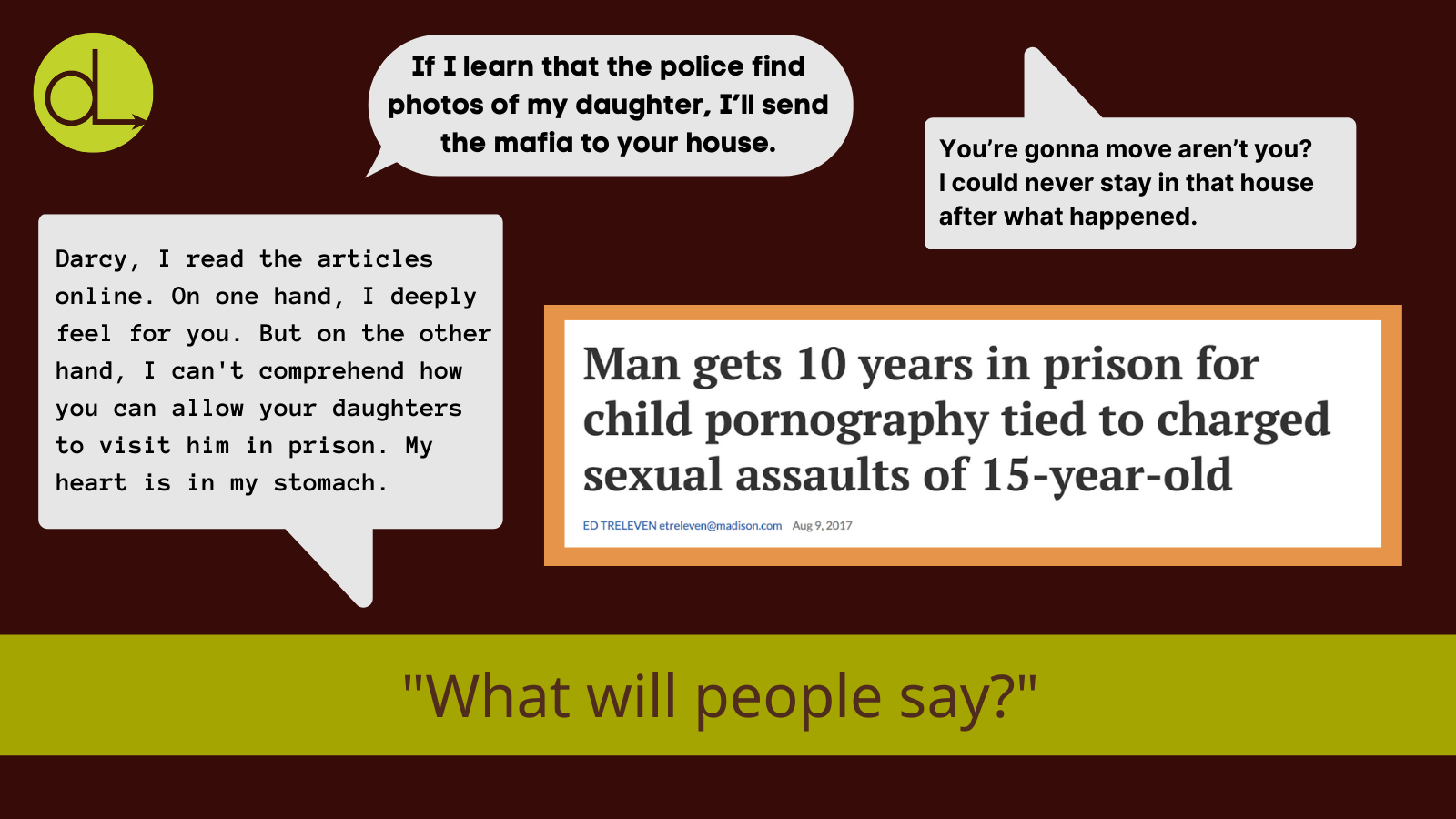It took me three years before I could speak about my ex-husband’s arrest publicly.
Why? I was afraid of what other people would think.
John was the one who was leading the double life. But that didn’t stop people from asking me if I had anything to do with it or if I’d known what was going on. As much as I understood people’s shock and confusion, that question was like a dagger every time I heard it. How would I be able to deal with it if more people knew the story of what happened?
What John did was unacceptable on so many levels. Yet, after a lot of time, therapy and reflection, I forgave him—for my sake. I made the choice to co-parent with him—for the sake of my girls. I know these choices are what’s best for my family. I also know it may be impossible for others to understand the choices I made. I have no control over that.
John’s behavior impacted my life in ways I never could have imagined. But I also can’t imagine what the survivor of John’s actions has gone through. Who am I to share this story? Will people think I’m looking to profit from this tragedy? How will this impact my daughters? Will people only think of this story when they think of Darcy Luoma now?
With my book’s release this week, these thoughts are back in the forefront of my mind. I’m proud of this book and thrilled at the opportunity to share this message of Thoughtfully Fit to help others address their people problems, lead from the inside out, and build their core confidence. I’m sharing my story, no one else’s. And yet there is still that trash talker questioning, “What will people think? Will they look at me differently? Will they judge me?”
Stretching to Accept is Not Easy!
The reality is, I cannot control what other people think of me, my family, or my choices. That doesn’t mean it doesn’t still hurt when I’m judged. However, I can only control how I respond to others. And that includes how I respond when I’m judged.
Let’s be honest. When someone criticizes your work or your family, it’s easy to criticize them back. They started it, right?
Or if someone doesn’t understand a choice you’ve made, you want them to understand. If you just explain it the right way, maybe they’ll get it. And then maybe they won’t judge you.
Stretching to accept someone is hard. Accepting their judgement of you can be even more difficult.
You have the choice to spend time criticizing others—in an attempt to feel better—or wishing they would just understand, so they wouldn’t judge you. Truth? It’s a waste of time trying to get someone else to change.
This is where the Thoughtfully Fit practice of Flexibility comes in. Here’s an excerpt from my book:
If we can accept that there are many things we care about and that we have no control over, we can expend our energy on things we can do something about. Because all that ranting and wishing they’d change? Nothing but wasted energy.
During your last visit with your family, how much time did you spend silently fuming about whatever thing made you angry? And once you were home, did you vent to your friends about your family’s behavior? Do you spend lunch with your coworkers complaining about your boss, or your commute home fixated on how insensitive your officemate is?
We collectively spend massive amounts of time and energy thinking about all the ways other people could be different and fantasizing about how great our lives would be if they would change. As a matter of fact, “How can I get someone else (my boss, coworker, spouse) to be different?” is one of the most common questions at my workshops.
But does all this thinking about what other people should be doing differently result in change? Not usually. So, what if you could reclaim all those hours for yourself? Imagine all the things you could accomplish if you never spent even five more minutes complaining that your husband doesn’t do the dishes. You’d have finished all your house projects, folded the laundry, gotten your expense reports filled out, gone to the gym, and taken a nap. And that’s just today!
If you can begin to stretch for complete acceptance, you’ll be in a place where you can focus on things you can change. Flexibility does not mean nothing can change, but it does mean that you stop trying to change others. Go ahead and change your own behavior, your reactions, your willingness to engage, and anything else you can control that will improve things. But don’t wait for other people to change.
 One-minute Core Workout
One-minute Core Workout
Just like physical flexibility doesn’t come after just one yoga class, Thoughtfully Fit Flexibility takes time and effort to develop. Here’s a one-minute workout you can do over and over. (This is the workout I’ll be doing a lot over the next few months.)
- Pause: When you notice the judgement, coming either from you or at you, hit that Pause button.
- Think: What can I control here? What would be a waste of energy to try to change?
- Act: Focus on what you can control and stretch to accept that you can’t change other people!
We all have stories that are difficult to share because of the fear of what others might think. With Flexibility, it can be easier. Start with just a little stretch towards acceptance and see what’s different for you.



